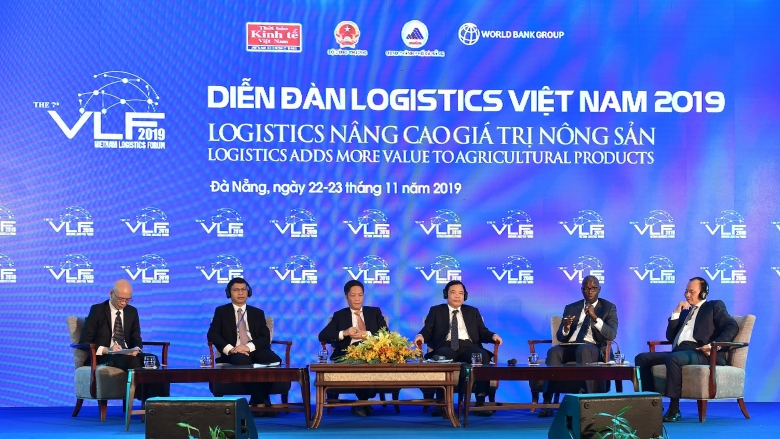Deputy Prime Minister Vuong Dinh Hue; Minister of Industry and Trade Tran Tuan Anh; Chairman of the People’s Committee of Da Nang City Huynh Duc Tho; members of the private sector, ladies and gentlemen, good morning.
On behalf of the World Bank, it is my pleasure to attend and address the 7th Vietnam Logistics Forum (VLF) in the beautiful City of Da Nang this morning. As demonstrated by the World Bank’s continuing support of the VLF (with funding from the Government of Australia), we consider logistics as key to increasing Vietnam’s competitiveness and promoting inclusive growth.
The recent history of Vietnam has demonstrated that efficient agriculture value chains are central to fast and inclusive economic growth. Over the past two decades, they have guaranteed better access to markets for famers – who don’t forget still count for almost half of the country’s labor force today – and lifted them out of poverty. Equally important, these value chains have brought food to households, especially those living in urban centers. I don’t have to remind you that Vietnam is today one of the largest exporters of rice and coffee in the world. Similarly, while food security was a big concern 30 years ago, almost all Vietnamese can eat a minimal basket of food today.
However, success cannot be taken for granted. The country will go through a series of deep structural changes in the coming years. Let me give two examples of domestic structural changes that will influence where the food is produced and consumed in Vietnam. First, agriculture diversification will create new production centers as value added products such as fruits and vegetables require different soil and climate conditions than rice or cereals. Second, the speed and shape of urbanization will impact on the demand for agricultural products and influence existing commercialization circuits.
Not only Vietnam is changing but also the world outside. The most recent figures confirm a slowdown in world production and trade. Rising uncertainty is also impacting negatively on cross borders investment flows. In this context, Vietnam will need to be more competitive to capture additional market shares in regional and global markets. In this new and changing environment, improved logistics will become a requirement as it can greatly reduce the costs of trade.
Improving logistics for Vietnam will require a smart strategy to develop and maintain connective infrastructure. This should start by building better and more efficient roads, ports and airports. Equally important will be to modernize the fleet of motorized vehicles. You don’t want good roads with bad trucks driving on them.
Yet, as you all know, moving products is not only about hard infrastructure and vehicles but also on the quality of the administrative environment. Often, trade is penalized by delayed inspections or heavy taxes and fees. Unfortunately, Vietnam appears weak on this point. The recently launched 2020 Doing Business indicates that Vietnam is ranked only 104 out of 190 countries (behind Singapore (47), Thailand (62) and Malaysia (49) when is measured the quality of its procedures across borders. Food products, as perishables, are in most cases highly time sensitive to clearance processes.
Based on the World Bank’s global experience and recent analytical work, trade administrative procedures can be significantly improved by (a) the use of disruptive technologies such as automation, blockchain and IoT and (b) better coordination of government agencies at the national and provincial level.
• Promoting the use of disruptive technologies. A number of countries are already using technologies such as automation, blockchain and Internet of Things (IoT) to leap frog and better enhance logistics performance. Logistics service providers, even in Vietnam are increasingly automating their operations as part of IR4.0. I understand that the Customs authorities of Vietnam and Korea are working together to pilot the use of blockchain technology to improve and streamline processes between the two countries thus improving trading across borders. The World Bank has undertaken a pilot in the coffee value chain in Vietnam to demonstrate how the use of blockchain technology can lead to greater ability to trace origin of consignments to specific farmers and also to improve customs procedures. IoT is already helping some rice farmers in Vietnam use remote sensors to have more efficient water use and reduce carbon emissions.
• Improving coordination of government agencies at the national and provincial level. Such coordination is vital as clearances process involve multiple agencies, ranging from those in charge of trade and transport related infrastructure (e.g., ports, railroads, roads and airports) to those responsible for sanitary and health inspections.
In closing my remarks, it is my belief that by focusing on the two key issues that I have highlighted, we can greatly improve Vietnam’s logistics performance and thus enhance agro-products. The World Bank Group is strongly engaged in the logistics and trade agenda in Vietnam as we are about to launch a new report titled “Vietnam Development Report (VDR) 2019: Connecting Vietnam for Growth and Shared Prosperity”, which explores how Vietnam can better integrate into global and domestic markets. We look forward to strengthening our going analytical, technical assistance and lending support to the Vietnamese Government and people and I wish you all very fruitful discussions this morning and look forwarding to meeting and interacting with you all.
Thank you!


